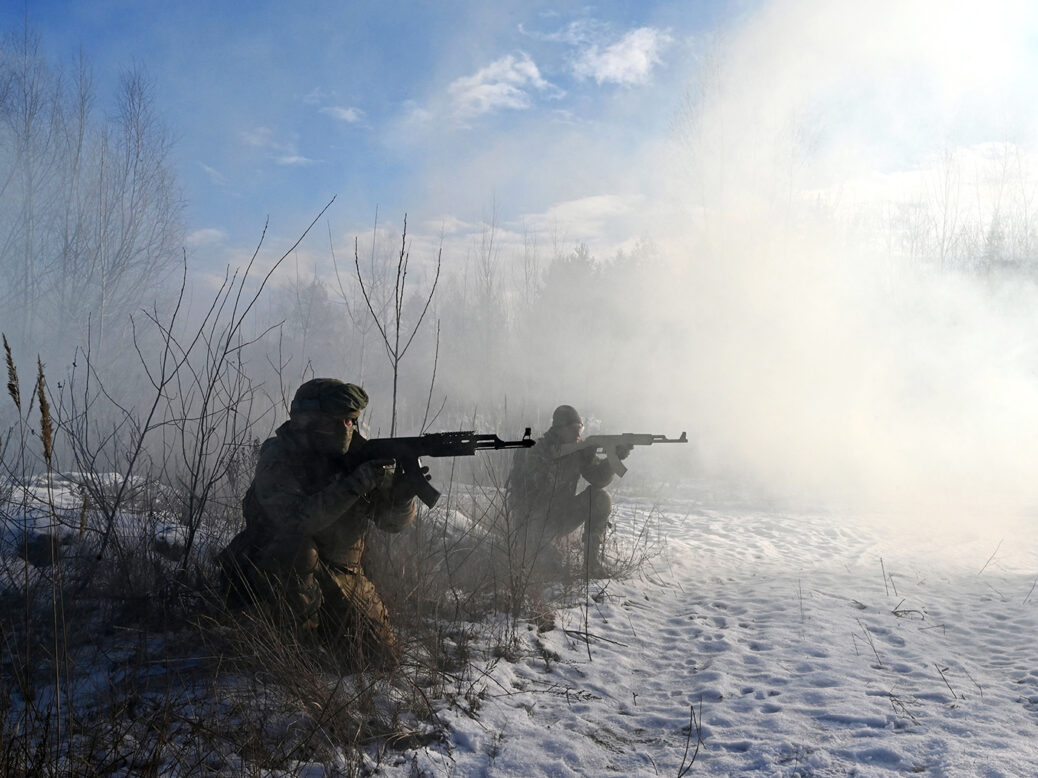
KYIV, Ukraine – There’s a bitter joke in Ukraine that its revitalised armed forces have a founding father. His name is Vladimir Putin.
Indeed, Russia’s undeclared war on Ukraine, which has killed over 13,000 troops and civilians since 2014, has spurred on many things that should have been done in this country years, if not decades, ago.
Now, as a stunned world watches Russia amass over 100,000 troops on the border in possible preparation for a full-scale invasion, Ukraine is bracing itself for war all over its territory.
[see also: What would a Russian assault on Ukraine look like?]
It has hastily established what it calls the Territorial Defence Forces – a mass citizen militia and home guard intended to help the regular Ukrainian military stand up to Russia’s crushing war power.
The National Resistance Act, passed by the Ukrainian parliament in July 2021, entered into force in the new year, giving this new organisation a clear structure and explaining in detail how it should work.
The idea is hardly new. This is a network of armed civilian minutemen giving up their free time to serve in their communities. Volunteers continue to work in their regular jobs, stay with their families and are deployed for exercises and combat training in their town or city from time to time (for instance, every Saturday).
It’s expected that drills in weaponry and tactics will be run by regular military officers and experienced combat veterans of the conflict in the eastern Donbas region, with tens of thousands of them now back in civilian life across the country.
One of those is Anton Goloborodko, an active member of the 112th Brigade in Kyiv.
“As the enemy approaches any big city, it will face a choice what to do next: to surround and storm it or to bypass it and move on,” he says.
A combat veteran of Donbas with the 80th Airborne Brigade in 2015-16, he became a popular TV news anchor after being demobilised and decided to join the emerging home guard in 2020 in order to continue with his career and keep his combat skills in good shape.
“If the enemy opts to encircle and assault, the whole thing turns into a never-ending inferno of protracted urban warfare, which is a very hard thing,” Goloborodko says.
“If it decides to bypass, the occupying power faces the situation when all of its supply lines are under the gun from inside. It would have no idea where and what kind of threats might pop up, what combat sorties might be expected.
“In other words, this makes any large attack an extremely dangerous idea doomed to fail right from the start.”
Militia units are supposed to take on auxiliary missions in their home regions, supporting Ukraine’s 250,000-strong regular armed forces and other uniformed agencies by ensuring the security of key infrastructure, maintaining law and order away from the front lines, countering sabotage operations, and more. The Ukrainian military expects volunteers to be motivated and trained enough to join active combat, if necessary, with the standing army.
The National Security Act envisages 25 territorial defence brigades covering all of Ukraine’s regions and the biggest cities, except for Russian-occupied Crimea. That’s nearly 150 battalions, each with 600 volunteers, in every territorial district (the equivalent of counties in Britain).
In total, the force expects to enlist up to 130,000 personnel, overseen by 10,000 regular military service members. The National Resistance Act makes the militia a new standalone branch of military service, along with the navy, the air force, or the army.
Enlistment is open to almost anyone aged between 18 and 60, male or female, unless they have a criminal record. They must pass medical and psychological examinations and then swear an oath as territorial defence volunteers.
Amid the Russian-instigated crisis, the new force in Ukraine has received a lot of media attention and public interest. As a January poll by the Kyiv-based Ukrainian Institute for the Future showed, 32 per cent of Ukrainians said they were willing to participate in the new home guard. Many expats in Ukraine were also glad to know that foreigners lawfully residing in the country for at least five years can enlist as well.
This is expected to be a very light, highly mobile infantry with a good understanding of its home terrain. No heavy weaponry, such as battle tanks or howitzers, will be assigned.
The military is relying on the sense of fraternity and loyalty among the weekend soldiers. Senior officers admit that the volunteers are not supposed to face any serious sanctions for missing drills for work or family reasons.
The organisation is still in the making, but combat units created previously, such as the 112th Territorial Defence Brigade, are already running regular live-fire exercises.
So if the worst happens and Russians go beyond Donbas and Crimea, those men and women are expected to take up their rifles and protect their own homes.
Beyond that, the regulation also envisages the expansion of Ukrainian special forces, with the recruitment of 1,000 new members who would remain in enemy-occupied territories undercover and organise a resistance movement – if it comes to that.
Nonetheless, as the militia’s recently appointed commander, Brigadier General Yuriy Galushkin, said on 19 January, an effective home guard could be key in making an invasion and occupation of Ukraine far too costly for Russia, and therefore prevent a bigger war.
Even though the popular militia will never be as strong as the standing army, it could still cause trouble for a Russian offensive.
It remains an open question, however, if the new territorial defence initiative ends up being as effective in practice as it is on paper, something which is very often not the case with Ukrainian institutions.





